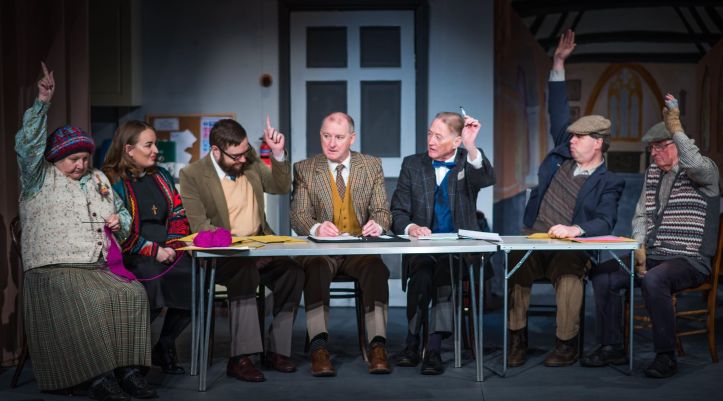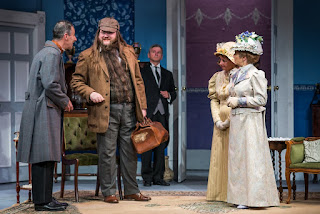The Apollo’s December production is, unlike most current shows, nothing to do with Christmas, but its subject matter is almost as familiar as the nativity story to those over a certain age, as the script is derived from various episodes of the hugely popular TV series of the same name, cleverly stitched together to form a coherent storyline taking us from the Vicar’s arrival in Dibley up to the wedding of Alice and Hugo.
With such a script, the show cannot help but amuse, but the generous amount of laughter evident on the first night was just as much due to the quality of the actors on stage. Sensibly, each character was re-created by its actor rather than trying to perform a carbon copy of the original TV cast.
Thus, we had a tall, dapper but characteristically pedantic Frank Pickle, played with understated skill by David Carr, sitting at the parish council table alongside no,no,no,no…yes – Mike Groves’ bumbling Jim, who excelled in the scene where he practised his wedding speech. The role of challenged cook and flower arranger Letitia Cropley was in the safe, experienced hands of Helen Clinton-Pacey, and equally professional was Simon Lynch playing Owen Newitt, the farmer obsessed with the bowel movements of his cows. The brief appearance of some, er, rather aged twelve year olds, played by Carole Crow, Dave Talbot, Maggie Cardew, Maureen Sullivan and Lucy Benton added to the fun.
Steve Reading as David Horton dominated the council meetings and the stage, which made his softening towards the end all the more emotional, while the intellectually challenged couple, Hugo and Alice were both superbly portrayed by Matt Osborne and Carol Simpson. Their onstage chemistry was hilarious, and the costume department is to be congratulated on the confection that was the wedding dress!
Each character had their own moment of hilarity but it was of course Geraldine, played by Hebe Gregory who held the whole show together, and the audience loved and laughed along with her from the moment she exploded on to the stage to the last poignant moment when David asks her to stay in the parish.
The dual set, with the parish hall on one side of the stage and the vicar’s home on the other were superbly designed and enabled slick scene changes, necessary in this episodic piece, moving the story along effectively.
All in all, if you have tickets for the rest of the run, you are in for a real treat – but beware, you may end up with sore sides from laughing. If you don’t have a ticket, the run is sold out, but it may be worth calling the theatre just in case of a cancellation. The show runs from Tuesday 11th to Saturday 15th December, curtain up 7.30pm.

The cast of The Vicar of Dibley - photo credit Paul Jennings





